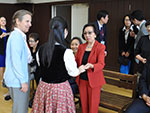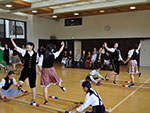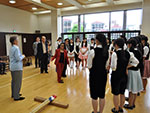Domingo-sensei’s visit

“ Miss Domingo! Ogenki desuka?! ”
A group of graduates – most of them grandmothers – swarmed like high school girls around a small woman dressed in a bright red pantsuit and very high heels.
Delia Domingo-Albert was back in Japan to attend the 27th Global Summit of Women, but was taking time out for a sentimental journey to Friends School.
Hers is a remarkable story. At the age of eighteen, she had already passed the difficult examination to join the foreign service of her country, the Philippines, but was told that she was too young to become a diplomat. To join the Foreign Ministry, she would have to wait for four years.
Thanks to Quaker connections, she spent those four years (1962-1966) teaching English at Friends School. Finally able to join the diplomatic corps, Ms. Domingo-Albert served for many years as the Philippine ambassador to Australia and to Germany. She then went on to become her country’s first woman foreign minister and to chair sessions at the United Nations Security Council. “Friends School was the beginning of everything,” she said. “It gave me confidence in myself.”
During her time here, Domingo-sensei became very close to her students – some of whom were only a year younger than she. It was those ex-students who recently gathered around her to share their memories and old photos. Domingo-sensei, too, brought with her a large album of carefully-kept mementos from her time at the school. “I regret I couldn’t bring all five of my Friends School albums,” she said.
Before having lunch together, everyone went to the small gym, where the Folk Dance Club had prepared a dance to show their visitor. To Domingo-sensei’s great delight, the students performed the bamboo dance which is a highlight of our annual school festival and which she herself had introduced to the members of the club in 1962. For fifty-five years, students had faithfully practiced it and passed it on to the next generation.


At the end, Domingo-sensei praised the dancers and rewarded them with an explanation of the meaning of the dance. She said that it tells the story of farmers whose crops are being eaten by long-legged birds. The farmers set traps to try to catch them, but the birds always escape.
It was a great privilege to be able to welcome Domingo-sensei to the school again. In addition to a living dance tradition, she has given our graduates a lot of fun and inspiration for their lives as women.